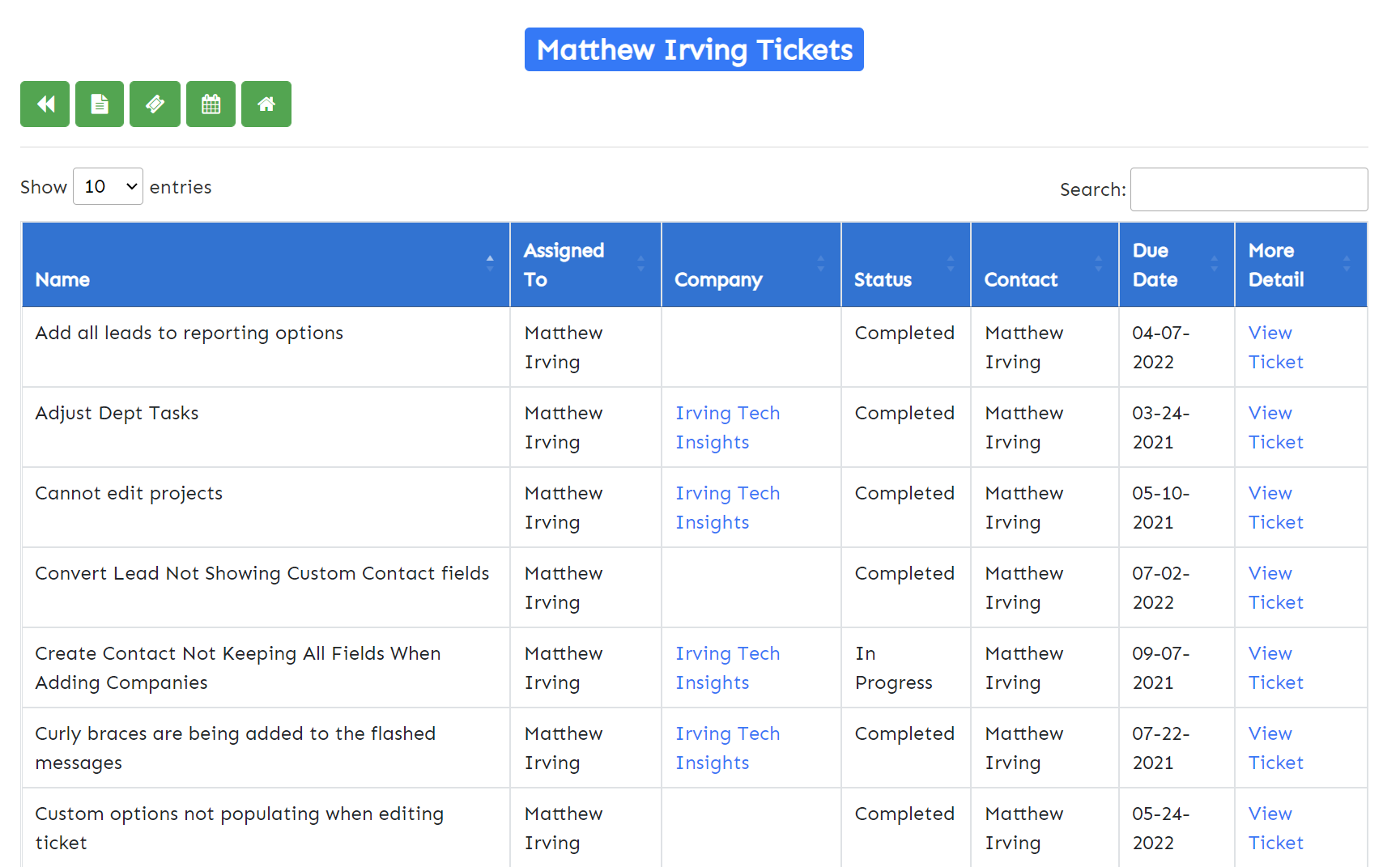How Can I Track Customer Issues?

Customer Issue Tracking Systems
The absolute best way to track customer issues is to use an issue tracking system. These systems can either be standalone like Jira or Fresh Desk or bundled directly into your CRM as Super Easy CRM does.
Now, unless you are developing software or managing agile projects, there is very little benefit to using Jira over your CRM for tracking customer problems. If you do go with Jira, you'll be paying for a ton of money features that you will never use.
Instead, why not track issues in the same place you store your clients in the first place? Super Easy CRM allows you to create tickets/issues and attach them directly to your customer's profile.
This way you won't need to scour emails or sticky notes when trying to figure out why a client is unhappy with you. You'll also save a ton of money by avoiding costly API integrations from an external issue-tracking system to your CRM.
Depicted below is a snippet of issue tracking within Super Easy CRM

Once you have enough data, you can simply export your tickets directly from the customer's profile. These reports are great to have ahead of meetings and help to reassure customers that you care about their problems and are making a conscientious effort to resolve them.
Issue Tracking Mistakes To Avoid
#1 Don't use your inbox for issue tracking
The single worst way to track customer issues is via your e-mail inbox. Outlook, Gmail, and others were not built to be information repositories and trying to treat them as such will resort in disaster.
I've seen a number of people create an inbox folder within Outlook to house all customer complaints. With Outlook inbox rules you can automate this a bit and have messages containing certain words move into a designated folder automatically.
The problem with this method is two-fold: one, you cannot possibly scale with this approach and two, no one else knows what's in your inbox. Unless you work by yourself, there will come a time that someone else will need to assist with the tasks you do at work.
Your colleagues cannot fill in for you if they don't know the issues you were working on.
#2 Don't use Excel as a database
Granted, this is a major step above using an inbox as an issue management system but it's still a gross misuse of great software. Microsoft Excel and Google Sheets are perfect for ad hoc analyses and reports.
However, they completely suck as a database solution. This is largely due to the fact that the good people at Microsoft and Google did not create the tool for this purpose.
Although you can collaborate on a single spreadsheet, the checks and constraints to protect data integrity are not present in the way they are with a real database. Scalability is also a problem as you will need to add a row or column every time a new issue comes in.
This will turn your spreadsheet into a clunky, cumbersome, 2 million terabyte file that nobody will want to work with.
#3 Don't allow people to determine when they should log an issue
Independent thought, creativity, and autonomy are the pillars of most successful companies. But, allowing people to define what they deem as a "log-worthy issue" will result in many issues not being logged.
As business owners, we should be instructing people on what we want to see stored as issues in our systems. People should be given clear guidelines on what should and should not be considered an issue with a customer.
Failure to establish a clean and clear business process with respect to issue logging will result in either a database that is too noisy to be of any use or one that is so sparse you are completely clueless to customer issues.
What type of customer problems should be recorded?
Sometimes, too much data is just as bad as too little data. As such, it's imperative that only valuable data be entered into your information repository.
Individual needs will vary based on industry and compliance requirements. But ALL businesses should be documenting any issues that have the potential to negatively impact the company's ability to obtain and retain customers.
To illustrate this, here are two hypothetical customer problems. One you should definitely record and the other, not so much.
- #1 Your customer calls in complaining that the hold time is so long in the afternoon hours that they refrain from calling until the evening.
- #2 Your customer complains that the new legislation introduced by Congress is impeding their ability to quickly access their information from your firm online.
The first issue is actually great feedback. The customer was very precise about their complaint and even gave you some information that you can use to pinpoint the root cause of the issue.
This is something that should definitely go into the issue log. If you notice it is happening with more and more customers, you can make an informed business decision on how best to remedy the situation.
The second complaint, while valid, is not worth going into the issue tracking system. You could throw it in the notes section of their customer profile though.
The reason it isn't worth logging is that there is nothing you can do about it. New regulations, weather, natural disasters, and other acts of God cannot be controlled by you.
If people logged every single issue that the company was (1) not at fault for (2) unable to control (3) unable to provide a viable solution for, your issue log would look like a Reddit thread. It would probably be more entertaining but other than that, it would be a waste of storage.
It' nearly impossible to provide great customer service without tracking the issues your customers are having. Use the right tech (which in most cases is your CRM) to record all touch points and problems your clients are reporting.
Remember, it's much easier and cheaper to retain customers than to find new ones! Invest in the software you need now so you don't lose business later.
- Free Paystub Generator
- Heloc Calculator
- Free Customer Journey Builder
- CRM Cost Calculator
- Employee Onboarding Automation
- Cleaning Business Name Generator
- Alternatives to Project Management
- Rent vs Sell Calculator
- Sprint Names Generator
- Credit Card Fees Calculator
- Mortgage Recast Calculator
- PTO Accrual Calculator
- AI in your mouse? ChatGPT and Logitech
- How Much RAM do I need, really?
- Bakery Name Generator
- How to Verify Salesforce Certifications
- Job Offer Letter Maker
- Salesforce Certified Admin Practice Exam
- Shortcuts That Make You More Productive
- Click Through Rate Calculator
- Tree Removal Cost Calculator
- Tattoo Tip Calculator
- Essay Title Generator
- Spotify Royalty Calculator
- Deadline Calculator

Posted by: Matt Irving on 1/08/2022